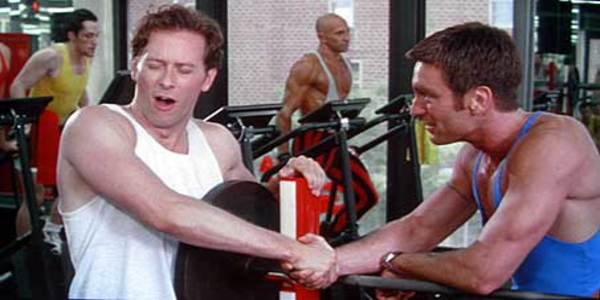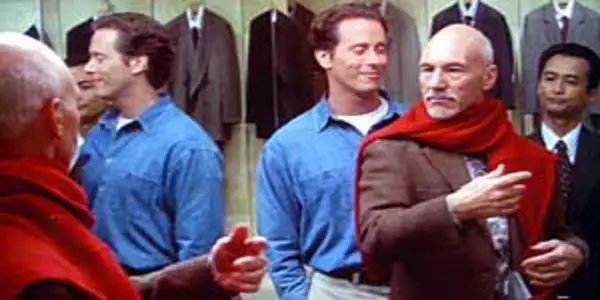Queerly Ever After #2: JEFFREY (1995)

Amanda Jane Stern is an actress, writer, and director from…
Queerly Ever After is a bi-monthly column where I take a look at LGBT+ films that gave their characters a romantic happily-ever-after. There will be spoilers.
1995 was simultaneously the height of AIDS-related deaths in the U.S. and the year that having AIDS was no longer an automatic death sentence, a contradiction that Jeffrey fully embraces, always teetering on the edge of potentially borrowed time. Asking the question, can this relationship last and, if so, for how long? Jeffrey, written by Paul Rudnick (adapted from his off-Broadway play of the same name,) and directed by Christopher Ashley, tells the story of thirty-something, New York gay man Jeffrey (Steven Weber) who has sworn off sex because it is now just too scary. Then Jeffrey meets Steve (Michael T. Weiss) and, whew boy, does he want Steve. But, not only has Jeffrey sworn off sex, Steve is HIV+.
An AIDS Comedy?
With a plot-line like that, Jeffrey sounds like quite the melodrama, but it’s a comedy, and a truly funny one at that. A comedy with an insane menagerie of celebrity cameos: Victor Garber as a sex addict; Nathan Lane as a horny, gay priest; Sigourney Weaver as an offensive and unhelpful motivational speaker and Kathy Najimy as her poorly-permed acolyte to name a few. The movie is told in ten vignette-like chapters charting Jeffrey’s decision to forgo sex through to his happily-ever-after. Yes, of course he and Steve end up together, that’s why I’m writing about this film.

While Jeffrey can at times be laugh-out-loud funny, it is still a movie about a man so afraid of contracting AIDS or, even more so, of watching someone he loves die that he chooses to close himself off from life and love instead. When the movie hits its more somber notes, and there are a few, it really hits. I found myself going directly from laughing to crying to laughing again, even during the technically happy ending.
The rest of the main cast is rounded out by Jeffrey’s best friend Sterling (Patrick Stewart in a show-stealing role,) and Sterling’s HIV+ boyfriend, Darius (Bryan Batt,) a dancer in Cats. Sterling believes that Jeffrey needs to settle down with a boyfriend, that will settle everything, and when Steve comes into the picture Sterling gets on board. Jeffrey, however can not get past his fear of falling in love with Steve only to watch him die, he spends the majority of the film trying to avoid Steve and his feelings for him, so he proceeds to run from Steve and his feelings.
Jeffrey Wants Steve
Jeffrey represses his desire for Steve to such an extreme that when he and Steve run into each other at an event they are both working, a hoe-down for AIDs research led by Christine Baranski, Jeffrey can’t even give in to the fantasy that Steve paints of them together. Of course, by the end of the movie, Jeffrey has finally realized that he can’t keep running from his feelings and life just because he’s afraid. In the last scene, Jeffrey invites Steve to the event space where the earlier hoe-down occurred for a romantic dinner. Steve is wary, after spending so much time pursuing Jeffrey he’s afraid that Jeffrey will only flee again, but Jeffrey wins him over in a scene that is both heartbreaking and heartwarming.

During the date, Jeffrey takes out a balloon (a call-back to an earlier scene with Nathan Lane) and dares Steve to not let the balloon touch the ground. Metaphorically, as long as the balloon stays in the air, Steve will live. Before they kiss, Jeffrey kicks the balloon into the air, where it continues to fly, signifying that these two have an actual chance and Steve will be okay.
Not everything about this film works. At times it’s theatrical origins come through a tad too much, particularly with a running gag of Jeffrey being saved by Mother Teresa, and the scene with Nathan Lane (added I think to break the tension that is build in the scenes before and after it) runs much too long. For those few things that don’t really work, the rest of it does. It’s definitely worth a watch, or, if you’re anything like me, several watches.
Jeffrey had a limited theatrical release in the U.S. on August 4, 1995 with a wider release on August 18, 1995. it was released in the U.K. on April 12, 1996. For all international release dates see here.
Does content like this matter to you?
Become a Member and support film journalism. Unlock access to all of Film Inquiry`s great articles. Join a community of like-minded readers who are passionate about cinema - get access to our private members Network, give back to independent filmmakers, and more.
Amanda Jane Stern is an actress, writer, and director from New York City. She received her BA in Film, Television & Interactive Media and Theater Arts from Brandeis University. She loves regaling whomever will listen with her endless lists of fun facts and knowledge of film history. Follow her on twitter and instagram @amandajanestern












